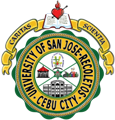On its second run, research papers from non-Recollect schools were accepted for the first time by the committee of the Recoletos National Research Congress.
The national event was held last March 5 to 7 of this year. Back in 2017, only papers from Recoletos-affiliated schools were accepted on the first run of the research congress.
At least 56 submissions were received by the committee after sending invitations to all the 17 members of the Visayas-Mindanao Consortium for Journal Publication.
Some of the schools which sent their presenters include De La Salle State University (DLSU), Leyte Normal University (LNU), Visayas State University (VSU), University of the Philippines Cebu (UP Cebu), Caraga State University (CSU), Northwest Samar State University (NSSU), and Far Easter University (FEU).
Only two Recollect schools joined this year namely the University of San Jose – Recoletos and the University of Negros Occidental-Recoletos (UNO-R).
Dr. Agnes Sequiño, director of the USJ-R Center for Policy, Research, and Development Studies, said the committee invited faculty members and students from other universities to widen the array of content which they can share to the academe.
“This is because we believe that the more participants we have, the more opportunity for them to also share their outputs,” she said.
Historically, it was Rev. Fr. James T. Bumangabang, OAR who initiated the Recoletos Research Congress according to Sequiño. Bumangabang is the Vice President for Academics of USJ-R.
“He said we have to think of our Recollect schools first; then we realized after the first congress that more contributors have submitted their articles to us and they need to be recognized as well,” says Sequiño.
Aside from accepting papers from other universities, making it as a competition rather than merely a presentation, made this year’s Research congress a stone to hit two birds at a time.
“While they judge, they also comment, indicate comments that can improve the paper,” said Sequino.
This year’s theme was “Research RElvance to COmmunity, Life, Education, Technology, and Organization towards Sustainability.” (RECOLETOS)
Scrutiny
The committee for the said research congress emphasized that the papers have been thoroughly reviewed even before the papers reached the publication stage.
Before publishing the papers went through the peer review process. After the peer review, the papers were endorsed to the Editorial Board. In this stage, an associate editor of a particular track made corrections and recommendations.
“The judges didn’t know where the paper are coming from or who is the author. It was a double blind review,” Dr. Sequiño highlighted.
The judging of the papers was done ahead of time so that the judges will also have enough time to read them. The criteria for judging were focused on the paper’s introduction (with clear problem statement and how it addressed the gap), methods, results and discussions (with credible and sufficient expert-based information sources), conclusion and organization (to include correct and communicative conventions as to overall writing.)
Winners
Eight tracks were opened for competition namely (1) Business and Finance, (2) Math, (3) Engineering, (4) Social Science and Philosophy, (5) Health and Environmental Sciences, (6) Education, (7) Information Technology, and (8) Management, Policy, Development, and Governance. Three judges per track were assigned to choose the best papers from each of the disciplines.
The following were the presenters who won the best paper awards:
| TRACK | TITLE OF THE BEST PAPER | AUTHOR | SCHOOL |
| Education | “Rethinking Catholic Education: Experience of Teachers of a Catholic University” |
Dennis V. Madrigal
|
UNO-R |
| Business and Finance | “Relativity of Structural Classification to Financial Behavior of Higher Education Institutions in Cebu”
|
Alessa Rose Tan | USJ-R |
| Social Science and Philosophy |
“Jean-Luc Marion’s Phenomenology of the icon as Apologia for Quiapo’s Black Nazarene Translacion”
|
Jean Gresil Kahambing | LNU |
| Health and Environmental Sciences |
“Global Patterns in Spatial Expansion of Dengue Serotype 1 in Response to Increasing Surface Temperature” |
Rhoniel Ryan Ymbong | USJ-R |
| Management, Policy, Development, and Governance |
“E-waste Profile, Trend, and Management System of Northwest Samar State University, main Campus” |
Noemi Majait | NSSU |
| Information Technology |
“Incorporating a Rule-based pattern Recognition” |
John Leeroy Gadiane | USJ-R |
| Math |
“Outer Convex Domination under some Graph Operations” |
Jonecis Dayap | USJ-R |
| Engineering (a tie) |
“The use of Electron Dispersive X-ray (EDX) Chemical Analysis to Determine the Inter-metallic Compound Layers that Caused Solder Failure.” |
Virgilio Abellana | USJ-R |
| Engineering |
“Comprehensive Behavior of Some Parts of Bamboo considering the Position of Nodes on Test Specimens” |
Erwin Miano | NSSU |
Josenian Pride
One of the six Josenian presenters who received an award was Rhoniel Ryan Ymbong, a faculty member of the Department of Mathematics and Sciences (DMS). His paper is entitled Global Patterns in Spatial Expansion of Dengue Serotype 1 in Response to Increasing Surface Temperature. It was co-authored by another faculty member of DMS, Joshua Jake Garces.
According to Ymbong, the paper was a product of a monthly research endeavor which was actually spearheaded and supported by USJ-R.
“The highlight there is that, daghan man jud kaayo og data. Ang importante lang is you know how to look on the data, how to present, analyze, and interpret it,” he said.
“It is important that you follow the critics of the professionals within and outside of the university. Research is a collaborative endeavor,” he continued.
Meanwhile, Sequiño added that those papers presented during the congress particularly those which were the best papers have the opportunity to have it published on the school’s Research Journal.
Written by Wenilyn B. Sabalo (The Purveyor Publications)

